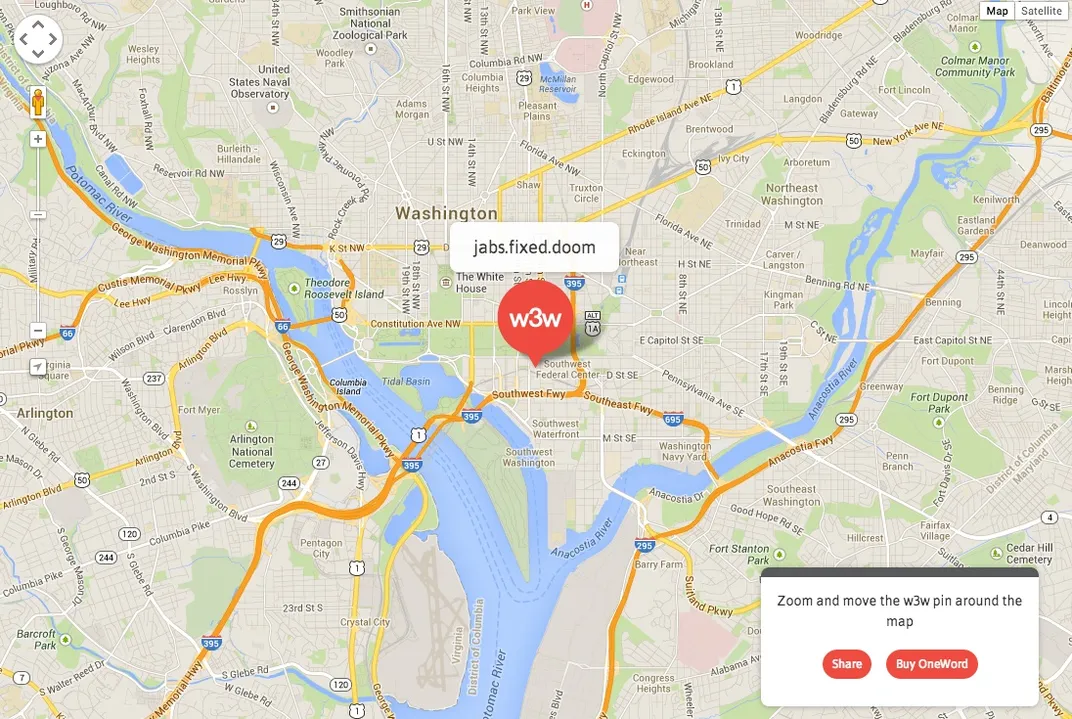A Plan To Replace Geographic Coordinates on Earth With Unique Strings of Three Words
The startup what3words wants to change the way we talk about locations
/https://tf-cmsv2-smithsonianmag-media.s3.amazonaws.com/filer/5c/ea/5cea567c-050b-432a-834f-fc94dcb1b49e/coordinates.jpg)
It's the rare idea that's both potentially transformative and simple enough to describe in a single sentence:
Divide the surface of the planet into roughly 57 trillion three-by-three-meter squares, label each one with a unique sequence of three random words (say, spouting.loves.granny or halfpipe.faster.tedious) and use these to replace the impossible-to-remember strings of numbers that comprise our geographical coordinate system.
"You cannot convey anything more effectively than with words. They're very quick to say, and have a very high verification rate," says Chris Sheldrick, CEO of what3words, the British startup that's out to replace numbers with words in the way we talk about locations. "Right now, over the phone, I could tell you 'knife.fork.spoon,' you could put that into what3words and it would give you one specific three-by-three meter square." (Incidentally, it's in North London.)
His company argues that the alternatives—reading out a pair of numerical geographical coordinates with roughly eight digits of latitude and longitude and minutes and seconds, or using normal postal addresses—are both more difficult and less accurate. To make life easier, they provide word-based coordinates for anyone to use in describing locations around the world.

Sheldrick first got the idea when he was working in event logistics and constantly experiencing the difficulty in getting people to arrive a precise location with only a postal address, often needing to add additional instructions (which unmarked turn to take, which gate to enter, and so on). "I just thought there must be some better system," he says. "Our technology is great, but the information we're feeding into it—in terms of addresses—is not really optimized."
He and friends wanted to exploit the precision of geographic coordinates, but encode them in a more user-friendly interface. They considered using language, and calculated that if they used three-word combinations for each location, and a vocabulary of 40,000 words in total, they'd be able to generate about 57 trillion unique identifiers—enough to cover the whole planet in three-by-three meter squares.
In March 2013, Sheldrick, along with co-founders Jack Waley-Cohen and Michael Dent, founded what3words, and by July, they'd developed algorithms that carried out this goal in English. The particular word strings aren't assigned entirely randomly. Words that are commonly used (and thus easier to understand and remember) are generally assigned to higher-population areas, whereas ocean locations have been assigned less often-used words—for example, quarterfinals.unobtrusively.repressions—in their identifiers.
Since, the company has released a website, along with free iOS and Android apps, that allow you to determine the three words assigned to any location—either by dropping a pin on a map or entering an address—and also find the location assigned to any three-word string. So far, they've created complete coordinate sets in English, Russian, Swedish and Spanish, and plan to reach ten languages in a few months' time.
Sheldrick envisions people using the system to share locations for all sorts of purposes. Any institution or person who's given out a postal address followed by a string of specific directions could be better served by providing three words. "It could be when you're inputting an address for a courier to deliver something to your house, or even emergency services applications, when you want to be more specific about where you need to be found," he says. It could be especially useful in rural areas, where many locations might not have street addresses.
The system could also be extremely valuable for a tourist visiting a country where addresses are given in another language. Each language's version of what3words covers the whole globe, so Spanish-speaking users visiting the U.S., for instance, could get American addresses as strings of Spanish words, making them much easier to remember and locate.
Of course, the company also wants to make money, and plans on doing so by selling special one word identifiers for any location in their system. Thus, if you pay $1.50, you get the right to associate a single word and a precise location for one year (longer periods can be leased for more money). Bob's Carpets, for instance, could claim bobscarpets, making it easier for any users of the system to find their physical store.
The next step, Sheldrick says, is persuading Google Maps and other navigation apps to understand the three-word (or special single-word) identifiers as locations (as well as postal addresses and conventional coordinates, as they currently do), so users don't need to visit what3words' website or apps to translate the word sequences into locations on a map.
So far, a courier company in Dubai—a country with a notoriously inaccurate postal address system—has integrated it into their delivery app, and an independent developer has created an app for the Pebble watch that lets people on either end of a phone call to share their precise location without interrupting the call. what3words is also creating a Google Glass-enabled app that would allow users to see the word identifiers associated with locations in the world around them.
/https://tf-cmsv2-smithsonianmag-media.s3.amazonaws.com/accounts/headshot/joseph-stromberg-240.jpg)
/https://tf-cmsv2-smithsonianmag-media.s3.amazonaws.com/accounts/headshot/joseph-stromberg-240.jpg)